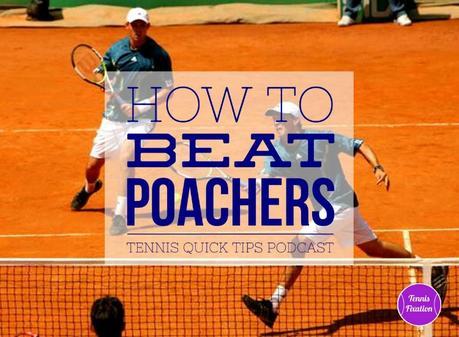Podcast: Play in new window | Download
How do you deal with those poach happy opponents who camp out right on the net? They can be effective despite having tennis skills that may be less than great. And they can really get into your head, psyching you out to the point where you almost can't hit a return! In this episode of Tennis Quick Tips, I'll give you six great tennis tips that will help you neutralize and beat those poachers. You can listen to this episode by clicking on the media player above or by listening in with your favorite podcast app. You can also subscribe in iTunes by clicking on this link: tennisfixation.com/itunes.

SHOW NOTES
Last week I mentioned that I had some really great listener questions that had come in recently and I was going to do a couple of podcast episodes centered on those. Then I think within a day or two of me recording that podcast, saying that I got a really good one from Peter. It was so good and it was on a topic that I had been thinking about but it really articulated exactly the problem that I wanted to talk about and give my suggestion for solution two. So let's talk about how to beat poachers because I know we all face them when we play doubles. Here is what Peter's email said:
Kim - After my doubles match last weekend, I struggled mightily returning the ball against a poach-happy opponent. This player camped out right at the net and roamed on every point. He didn't have great mobility, strong volleys or a strong overhead, but I was psyched out and made a bunch of errors. I'd like to know how a returner can handle this kind of annoying but effective psych-out technique. Any chance you could choose this as a podcast topic? Cheers, Peter
Dealing with the Poach-Happy Opponent
Well, great podcast topic and I did choose it because I have some thoughts on this. As Peter points out in his email, he was playing against a poach-happy opponent who really didn't have a lot of great skills otherwise. As he himself says, peter says "this opponent didn't have great mobility, strong volleys or strong overheads," but the guy was camped out right at the net and it not only was being effective as far as him having opportunities to put the ball away , it was getting in Peter's head. It is a great psych out technique when someone is camped right up there on the net. They don't have to be a great player.
So let's talk about what you can do when you face this, when you come against someone who is just roaming at the net and it is really bothering you, it's getting in your head. How can you deal with that and hopefully neutralize that player and maybe hopefully beat that player? I am going to give you six tips for dealing with that player and when I tell them to you they are regular straight up tennis tips, they are the kind of things you already know in your head. You just need to feel confident about using them and putting them into action against this player.
1. Lob Over the Net Player
Number one when dealing with this kind of player, lob the return. Lob the return over the net player. Doing this keeps the ball away from that poacher and then eventually it should force them to back off the net a little bit. If they don't back off the net then you just keep doing it. Now you have neutralized them because you are lobbing over their head, you are not giving them that chance to poach up at the net, you are putting the burden on their partner to run every one of those lobs down and not only can this result in you taking away the poach from that team, it could start to get irritating between the two of them. The partner who is back, who is having to run down all those lobs can get a little bit upset with his partner who now is not poaching but is just sort of standing up at the net doing nothing to help. So the lob return is a great way to deal with this poach-happy opponent up at the net. I did an episode on lob returns and it had some good tips for how to do a good lob return and I will link to that in the show notes for this episode. That one called used this retro tennis shot, the lob return. It is over at Tennis Quick Tips, Episode 54. That's your first tip, to lob the return over the net player.
2. Aim Your Return Down the Line or at the Net Player
Number two, aim the return down the line and or at the net player. This is the classic response to someone who is poaching a lot. You aim your return down the line or right at the net player and we have talked about doing that before in a very recent episode. That was episode 120 called "How to handle the return aimed at the net player." I will link to that in the show notes for this episode so that you can review that if you want because I spent a little bit of time talking about using that as a tactic and what I thought about it . I do believe that could be a properly applied tactic that you can use aiming at the net player if you do it correctly and the bottom line is if you are trying to get someone off the net, you have got to quit hitting that cross court return and try the down the line or at the net player return.
Now I am going to throw in here some of you're not going to want to do that one. You don't feel confident about your down the line return, you are worried that your partner is going to be upset with you if you miss it. You need to do it anyway. When you miss the down the line return sure it doesn't feel good but it puts it in your opponent's head that you are going to be trying that shot and it can make that poaching player hesitate a little bit. Maybe the return is going to go down the line and if you get a couple of those in they may back of their poaching because again their partner might be upset with them, telling them you have to get those down the line returns. I can't get over there and get those and that's what you want. Even when you are not successful with it, it starts to get in their head that's a shot that you are going to be trying. So number two tip, aim your return down the line or at the net player.
3. Have Your Partner Drop Back to the Baseline With You When You're Returning
Number three, if someone is poaching all over you and you cannot get your return pass them have your partner drop back to the base line with you. I don't like to do this but sometimes it is the right thing to do and you need to accept that and with both of you playing from the baseline, now they not only have to poach, they have to poach and hit a good shot. If all they are doing is poaching and just bumping the ball back over the net you're going to get up and get those. You are going to have your opportunity on those weaker poaches to take over the net again. It forces that poaching net player to not player to not just get to the ball but to actually do something with it. So having your partner drop back to the baseline with you, playing it a little bit defensively when you are first hitting your return can force hat poacher to have to do more with the ball and give you a chance if they can't do something with the ball take it up to the net again.
4. Focus on Your Target and Stick with It
Number four, focus on your target and stick with it. One of the ways that these poaching opponents get to us is they confuse us. We think they are going to move and so at the last second we change our return. We were going to hit just a straight up cross return but now we are worried about the poach and maybe we change it at the last second to hit the lob return or to hit the down the line return or to hit a different kind of cross court return. All of these things can throw you off and cause you to hit a bad shot .What you need to do is each time you are returning with that person playing at the net being the poacher you need to pick your target and stick with it and try to hit the best return that you can. If they get it, if they poach it, you learned you lesson and you are going to try something different the next time but pick what you are going to do and stick with it. Do not change your mind about the shot you are going to hit at the last second in the middle of the stroke. That is what they want you to do.
5. Lob Them to Death
Number five, play defensively and lob them to death. This sort of is like the lob return. Now what I am saying is you just keep lobbing them. Some people and I know this is true because I am one of these people like to play up at the net, do not want to move off the net no matter what. If you lob these people enough they will either stay up at the net therefore neutralizing themselves as an effective part of your team or they will back off to try to help their partner out and participate and that's what you want. People who are good up at the net don't like to play lobbers. If you can become that team that just keeps lobbing, keeps moon balling, keeps getting the ball back and letting your opponents make the mistake you can neutralize these poaching players.
6. Switch Return Sides with Your Partner
Number six, switch sides with your partner after the first set. If you really can't deal with this poaching opponent switch sides. Sometimes what you are doing on one side, it ends up being a very poachable ball that you hit and then when you switch to the other side that doesn't happen. Sometimes something that you are doing, that is resulting in your opponents getting a lot of poaches your partner isn't doing that thing. Something can change, just a little bit. So if you switch sides with your partner it may be enough to throw that poacher off and now it's not quite easy for them to do what they've been doing up to that point.
So those are my six tips for dealing with poachers and hopefully neutralizing them and ultimately beating them. Real quick to review, they are:
- Lob the return over the net player.
- Aim you return down the line or at the net player.
- Have your partner drop back to the baseline with you.
- Focus on your target and stick with it.
- Play defensively and lob them to death.
- Switch sides of return with your partner.
Now when I emailed Peter and told him I was going to do this podcast episode on his topi, he responded with this:
That's great to hear you're doing a podcast on the topic! I look forward to listening to it. And thanks for the tips in your reply, too! One more thought on this I wanted to share: as I was planning my approach to returning the ball against this guy, I was wondering if I should ignore what the guy was doing when I was returning, and just go with the percentages - that is, if he was poaching to the server's side 60% of the time (and I think it might have actually been that high), then I should just go down the line 60% of the time. Going down the line isn't actually risky if the net player more likely than not won't be there, but I was having a hard time getting that through my head during the game.
I really wanted to make sure to include this response of Peter's because even he sees it. His opponent was poaching on a certain side quite frequently and trying the down the line return obviously crossed Peter's mind and he definitely should have done that because the poacher was having more success poaching to one side than the other and so the way to shake him up was changing the return, doing something different. The down the line return would have been a great one to try and I think the lob return also would have been a great one to try.
You Don't Have to Be an Incredible Tennis Player to Be a Great Poacher
There is one final thing I want to say on this topic and that is, when you hear this, when you hear a player saying, "I just played someone, they were all over the net poaching like crazy, they weren't that great of a tennis player but they were really doing a good job of poaching and it got in my head and it got to me," that's the kind of player you want to be when you play doubles in my opinion. And it just shows you going through those poaches, being strong up there in the net, even if you aren't hitting incredible winners when you are poaching, it can be so effective. It does psych people out. You do end up having a lot of easy balls to put away because you are right there. I strongly encourage you to not just learn how to beat poachers from what you are hearing in this episode, but learn how to become a poacher yourself, learn to feel more confident in what you are able to do when you are up there in the net because, as Peter pointed out, this guy didn't have great mobility, he wasn't hitting great volleys or strong overheads and yet he was still able to effectively psych someone out, someone like Peter who is clearly a good enough player that he knows about playing high percentage tennis.
Anyway, that's it for this episode of Tennis Quick Tips. I hope those six tips on how to beat poachers will help you deal with those people and I hope even more it will make you feel like that's who you want to be, you want to be that poacher up there that people are getting psyched out by.
RESOURCES AND LINKS FROM THIS EPISODE
Click to go to the show notes and listen to more on poaching in these episodes of Tennis Quick Tips:
BUILD YOUR TENNIS FITNESS AND ENDURANCE
If you're really interested in building your endurance and fitness for tennis, I know you'll like my very first tennis mini-course, Simple Endurance Training for Tennis. For more information or to join the course, just click on the image below or visit: Simple Endurance Training for Tennis.

SHARE, SUBSCRIBE AND REVIEW
Thanks so much for being a listener and friend of the Tennis Quick Tips podcast. And I hope you'll consider sharing this podcast with your friends and leaving a review of the show as it really helps it to be found by other like-minded tennis players. You can listen in, subscribe or leave a review by going to:

© Kim Selzman 2016 All Rights Reserved

